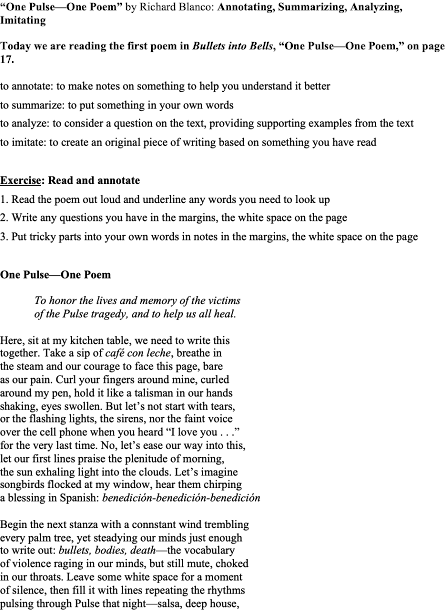Week 92: College Reading and Writing: Richard Blanco and Ladd Everitt
Week 92:
College Reading and Writing: Richard
Blanco and Ladd Everitt
Richard Blanco
and Ladd Everitt: Annotating, Summarizing, Analyzing, Imitating
to annotate: to make notes on something to help you understand it
better
to summarize: to put something in your own words
to analyze: to consider a question on the text, providing
supporting examples from the text
to imitate: to create an original piece of writing based on
something you have read
We are doing the fifth poem and response in our book today,
starting on page 17.
Exercise: Read and Annotate
1.
Read the poem and response
out loud and underline any words you need to look up.
2.
Write any questions you
have in the margins or in your notebook.
3.
Put tricky parts into your
own words in notes in the margins or in your notebook.
Exercise: Respond to Poem
Write a
response to this poem. What are your first impressions? How do you connect or
disconnect to the subject and speaker? Does the poem remind you of anything
from your own life and experience?
Exercise:
Questions for Comprehension of the Poem
1.
Who is Blanco talking to?
2.
What’s meant by the line “…keep writing
until / we never need to write a poem like this again” (Blanco 18)?
3.
What shift happens in the last stanza
of the poem?
Exercise:
Questions for Comprehension of the Response
1.
Why is it hard to “acknowledge
how precious all these people’s lives are while continuing to move forward”
(Everitt 19)?
Homework Assignment: Summarize the Poem
Write a
7-9 sentence paragraph summarizing the poem with quotations, in-text citation,
and a Work Cited Page.
Example Summary: Too short, but incorporates quotation and
in-text citation:
Richard Blanco’s poem “One Pulse—One Poem” starts with Blanco
invoking the reader, asking for help finding “our courage to face this page”
(Blanco 17). He describes the sound of the nightclub, “the rhythms pulsing
through Pulse…mixed with gunshots” and imagines the dead as a “choir of their
invisible spirits rising” (Blanco 17-18). Blanco expresses “[a]nger for the
voice of politics armed with lies” but ends with images of the dead when they
were alive and happy, from when they were children to “their very last selfies”
(Blanco 18).
Work Cited Page
(for today’s poem)
Blanco, Richard. “One
Pulse—One Poem” Bullets Into
Bells: Poets and Citizens Respond to Gun Violence. Ed. Brian Clements et
al. Beacon Press, 2017.
Homework Assignment: Summarize the Response
Write a 7-9
sentence paragraph summarizing the response with quotations, in-text citations,
and a Work Cited Page.
Homework
Assignment: Analysis
Question for analysis: What are some of the strategies in the poem
and the response for writing about something difficult? Which do you think are
the most effective as a reader or as a writer? Use quotation and summary to
support your answer, which should be 7-9 sentences.
Homework
Assignment: Imitation
Write your own poem asking the reader to help
you write about something difficult, anything you want. Use Blanco’s technique
of naming things as he does them, like “write one more stanza…” (Blanco 18).
Homework:
- Summary of Poem
- Summary of
Response
- Analysis of
Poem/Response
- Imitation of
Poem
About
this class:
In this class, you are welcome to submit
homework for a grade. If it’s not strong
enough to earn an A, I’ll give you some comments to help you revise it, and let
you do it over again. You have as many chances as you want to complete and
perfect the work in this class, and you are welcome to do more than one week’s
worksheet for homework at a time; ask me for sheets you’ve missed. Students who complete 15 weeks of graded
assignments and a longer paper can qualify for college credit. When you get close to completing 15 weeks,
I’ll help you get started on your longer paper.


Comments
Post a Comment